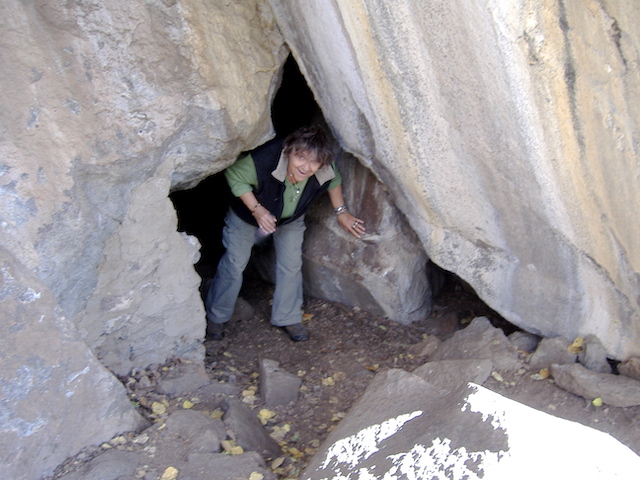A Conversation with Author, Mentor and Activist Mary Sojourner

Mary Sojourner has been a community and environmental activist and organizer since she was seventeen; and teaches writing: in private circles, one-on-one, at writing conferences and book festivals, and for Matador U, an international travel writing program. She says that writing is the most powerful tool she has found for doing what is necessary to mend oneself and the greater world.
She is the author of numerous books: three novels, a short story collection, an essay collection, a memoir, and a memoir/self-help guide. Her new short story collection, The Talker, is coming out from Torrey House in Spring 2017. She has been an NPR commentator for ten years, reviews books for KNAU’s Southwest Reviews, and is the author of op eds and columns for High Country News, Yoga Journal, Writers on the Range, Matador Network and dozens of other publications. She lives in Flagstaff, Arizona.
Mary spoke to Pink Pangea about why she writes and what she teaches.

When did you first start writing?
I believe I first started writing the moment I first was able to read. From my memoir, Solace: Rituals of Loss and Desire:
What came to me in that first grade reading circle was better. A little boy read aloud, stumbling through: See Jane. See Dick. See Spot. Suddenly, his voice seemed to fade. I watched the words on the page in front of me begin to connect. See Jane. See Dick. See Spot. See Jane run see Dick run see Spot run—as if the words came alive and raced down the sidewalk between the grassy lawns of Jane and Dick’s tidy neighorhood.
I checked to see if Miss Adams was watching. We weren’t allowed to skip ahead. She was focused on the boy next to me. Stealthily, I turned the page. Jane and Dick and Spot were running down a long green hill toward a bright lake. I looked around the classroom at the bookshelves and knew I would never have to be afraid or lonely again.
What inspires you?
Most of my writing has emerged from my connection with the natural world, and my rage. Most of that rage is in response to how thoroughly we humans are destroying the natural world. My essay collection, Bonelight: Ruin and Grace in the New Southwest came directly from my love for wild places (and not so wild) around the Southwest, and the greed caused destruction they were subjected to.
Mary Sojourner has been a community and environmental activist and organizer since she was seventeen; and teaches writing: in private circles, one-on-one, at writing conferences and book festivals, and for Matador U, an international travel writing program. She says that writing is the most powerful tool she has found for doing what is necessary to mend oneself and the greater world.
How do you motivate yourself to keep writing, if things get difficult?
I’ve written seriously for thirty-one years. In that time, I’ve learned that the writing ebbs and flows at its own rhythm. I’ve stayed afloat in flash floods of stories and a novel; dragged myself through droughts. I stay faithful to my deepest belief – we serve the writing; the writing doesn’t serve us. I find myself more often than not in a sweet trance, watching words appear on the page or the computer screen. I write about this rhythm in my mentoring website: Breakthrough Writing.
Sign up for a FREE online writing workshop here.
Did you start writing with the intention of being published, or did that come later?
Though I tell my students again and again to stop focussing on being published – especially in the frantic empire of on-line publication – I wrote my first poem when I was twelve and sent it to The New Yorker. Twenty-three years passed before I began writing an article on alternative women’s mental health care for the New Women’s Times, one of the first feminist newspapers in America. Another eight years passed before I moved to Flagstaff to write and fight for the earth. I wrote my first short story, Delicate (in the collection Delicate) in 1985. Since then, I’ve had seven books published — but not until after I wrote them.
I advise my students to stop pushing desperately to get published. That focus can kill the writing and stop the long apprenticeship that is required to become a well-crafted writer. I see too many essentially gifted beginning writers (young and old) racing into submitting their work for publication and by-passing the hard work of fully learning their craft.
(By the way, The New Yorker rejected my poem.)
A Conversation with Author, Mentor and Activist Mary Sojourner.
You have had a long career. How have you seen the world of publishing change?
The world of publishing – which I entered in 1985 – has gone from a business in which a good beginning writer could find a foothold to a profit-driven vampire. There were once dozens of good publishers. They have been sucked into mega-publishing corporations. We live with the tyranny of the Master in Fine Arts programs in colleges and universities, which control most of the literary magazines and have spawned a “literary” style that is too often flat and mannered. All of this reinforces my belief that beginning writers need to write and to read good writers.
You also teach writing. What are some common challenges that you see women writers (at any stage in their careers) facing?
Since I have deliberately chosen to not become an academic writing teacher, I won’t reiterate the dangers of far too many MFAs in creative writing programs.
The two most excoriating challenges middle-class or wealthy women writers face are insecurity stemming from childhood emotional damage and the contemporary epidemic of busyness. The challenges that poor women face are those two plus the draining reality of trying to survive in a society in which the rich suck the rest of us dry.
What tips would you give to women who want to be writers?
Consider that as you are in relationship with your life, you are in relationship with your writing. Step out onto a tightrope on which you balance between learning who you are and writing. The good news is that the writing will teach you who you are. I send writing exercises in Breakthrough Writing out each week – they are specifically designed to help writers balance on that high-wire.







